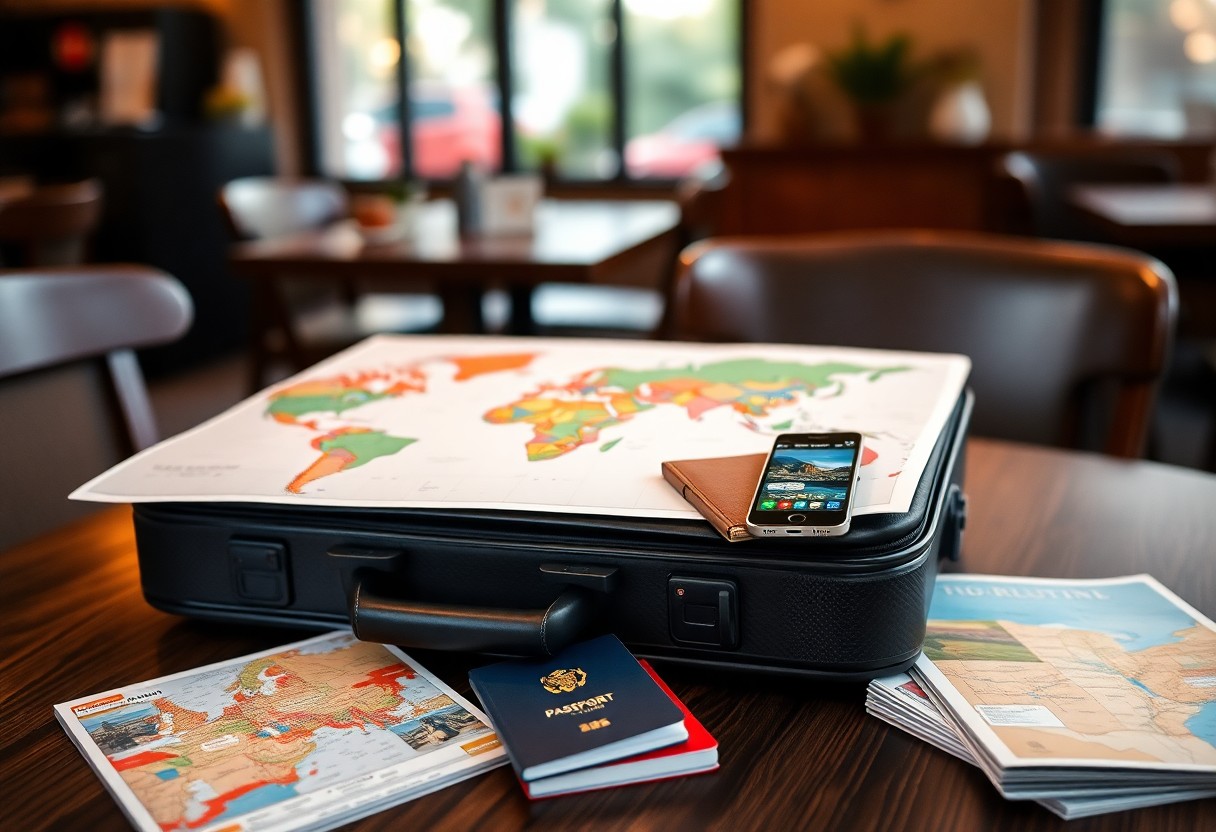
With careful preparation and smart choices, you can transform your travel experience from stressful to seamless. This guide equips you with necessary tips and strategies to navigate every stage of your journey, ensuring you feel confident and informed before you pack your bags, while you explore your destination, and as you return home. By following this comprehensive roadmap, you’ll maximize enjoyment, avoid common pitfalls, and make the most of your adventures wherever you go.
Key Takeaways:
- Plan ahead by researching your destination, including local customs, weather, and transportation options to ensure a smooth travel experience.
- Pack smart by creating a checklist that balances imperatives with convenience, considering the duration, climate, and activities of your trip.
- Stay organized during your journey by keeping important documents, like passports and tickets, easily accessible and securing your belongings.
- Embrace flexibility and stay open to new experiences, which can lead to more enriching and memorable travels.
- After returning, reflect on your trip by organizing photos, sharing stories, and journaling to preserve your travel memories and lessons learned.
Planning Your Trip
While planning your trip, you’ll want to consider all imperative aspects to ensure a smooth and enjoyable experience. From deciding where you want to go to booking accommodations and activities, thorough preparation sets the foundation for a memorable journey. This phase helps you align your budget, schedule, and expectations with your travel goals, so you can make the most out of your adventure.
Defining Your Travel Style
After understanding your preferences and interests, defining your travel style becomes key to tailoring your experience. Whether you prefer luxury, adventure, cultural immersion, or relaxation, pinpointing your style helps you select appropriate destinations, accommodations, and activities that resonate with what you seek in travel.
Researching Destinations
Travel research gives you insights into cultural norms, weather, local attractions, and practical considerations at your chosen destination. This knowledge empowers you to make informed decisions and avoid surprises that could impact your trip’s success.
Due to the plethora of options available, it’s beneficial to dive deep into various sources such as travel blogs, government advisories, and forums to gather authentic information. This comprehensive approach enables you to find destinations that align with your interests and provides awareness of any current events or health guidelines affecting your travel experience.
Creating an Itinerary
Your itinerary serves as a flexible roadmap, balancing planned activities with leisure time. Organizing your days efficiently helps maximize your experiences while maintaining a comfortable pace during your trip.
Further, taking time to prioritize must-see sights and allowing options for spontaneous adventures ensures you enjoy a fulfilling trip without feeling rushed. An adaptable itinerary also helps accommodate unexpected changes or discoveries that enhance your travel journey.
Understanding Travel Logistics
The success of your trip relies heavily on how well you manage travel logistics. By organizing your transportation, accommodations, and documentation ahead of time, you avoid unnecessary stress and maximize enjoyment. Paying attention to details such as flight schedules, local customs, and important regulations ensures a smooth journey from start to finish.
Visa and Entry Requirements
Entry into many countries requires a valid visa or specific entry permissions, so you need to check the requirements well in advance. Understanding the application process, processing times, and necessary documentation will help avoid delays or refusals at the border, allowing you to focus on your travel experience with peace of mind.
Health and Safety Regulations
The health and safety regulations of your destination are key to protecting yourself during travel. By staying informed about vaccination requirements, local health advisories, and emergency procedures, you can maintain your well-being and respond effectively if challenges arise.
It is crucial to consult official sources or seek advice from healthcare professionals before your trip to address any health risks. Carrying travel insurance, knowing where to access medical care, and following safety guidelines contribute to a worry-free journey, letting you enjoy every moment confidently.
Currency and Payment Methods
Logistics involving currency exchange and payment methods can greatly impact your spending and convenience abroad. Familiarize yourself with the local currency, exchange rates, and accepted payment options to manage your finances smoothly while traveling.
This includes planning how you will pay for accommodations, transportation, meals, and emergencies. Carrying a mix of cash and cards, notifying your bank about travel dates, and understanding transaction fees will help you avoid unexpected issues and make transactions effortless wherever you go.
Budgeting for Your Adventure
Not planning your budget carefully can lead to unnecessary stress and missed opportunities during your trip. Establishing a clear financial plan allows you to enjoy your travels without constantly worrying about money. Allocate funds for accommodation, meals, transportation, activities, and unforeseen expenses. A well-thought-out budget ensures you make the most of your adventure while maintaining control over your spending.
Estimating Total Trip Costs
Beside transportation and lodging, you should factor in activities, meals, local transport, and emergency funds when estimating your total trip costs. Research average prices for your destination and include extra padding for unexpected expenses. This estimation will give you a realistic financial framework, helping you save effectively and avoid overspending before and during your travels.
Daily Budgeting Strategies
Budgeting your daily expenses provides you with a roadmap for managing money throughout your trip. By setting a reasonable daily limit based on your total budget, you can control your expenditures more efficiently. Tracking your spending helps you identify areas where you can cut back or splurge, ensuring balance between saving and enjoying your experience.
Also, using apps or journaling your daily expenses can sharpen your awareness of where your money goes each day. This practice can reveal spending patterns, allowing you to tweak your budget on the fly, avoid surprises, and stretch your funds to cover imperative activities without sacrificing enjoyment.
Finding Deals and Discounts
Your ability to find deals and discounts can significantly increase the value of your trip. Look for early bookings, off-season rates, bundle offers, and loyalty programs. Utilizing travel comparison websites and subscribing to deal alerts ensures you don’t miss out on money-saving opportunities that make your adventure more affordable.
Understanding how and when to leverage discounts helps you plan strategically, targeting key expenses like flights, accommodations, and activities. Being flexible with dates and destinations also enhances your chances of accessing better offers, allowing you to experience more for less throughout your journey.
Booking Travel Essentials
Your travel experience starts long before you arrive at your destination. Securing the right flights, accommodations, and insurance will set the tone for a smooth and enjoyable journey. By planning these crucials carefully, you take control of your travel logistics and reduce stress, allowing you to focus on the adventure ahead.
Airfare: How to Find the Best Prices
Before booking your flight, research multiple airlines and use fare comparison tools to uncover the most affordable options. Be flexible with your travel dates and consider nearby airports to maximize savings. Booking well in advance or taking advantage of last-minute deals can also help you find prices that fit your budget without sacrificing convenience.
Selecting Accommodation
Find accommodations that align with your preferences and travel style, whether that’s a cozy guesthouse, an all-inclusive resort, or a budget-friendly hostel. Location, amenities, and user reviews should influence your choice to ensure comfort and convenience during your stay.
But don’t overlook hidden fees or cancellation policies when choosing where to stay. Dig deeper into the fine print to avoid unexpected costs and to ensure flexibility in case your plans change. Prioritizing value over luxury can often enhance your overall experience without breaking your budget.
Travel Insurance: What You Need to Know
Alongside booking flights and lodging, securing travel insurance protects you against unforeseen events such as cancellations, medical emergencies, or lost belongings. Choosing a comprehensive plan tailored to your destination and activities offers peace of mind throughout your trip.
Know that not all travel insurance policies are created equal; carefully evaluate coverage limits, exclusions, and claim processes. Investing time in understanding your policy helps you avoid gaps in protection and prepares you for how to act if an emergency arises.
Packing Effectively
Now that your trip is on the horizon, packing effectively becomes vital to ensure a smooth travel experience. You want to bring just what you need without overloading yourself. This balance helps you stay mobile and organized, reducing stress and making your journey more enjoyable from start to finish.
Essential Packing Tips
At the start, focus on versatile clothing items and prioritize comfort. Some helpful tips include:
- Roll clothes to save space and minimize wrinkles
- Pack travel-sized toiletries and limit liquids
- Use packing cubes to separate categories
- Include important documents and a small first aid kit
Recognizing these strategies will help you maximize space and prepare for unexpected situations during your trip.
Choosing the Right Luggage
On your journey, the right luggage can make all the difference in ease and convenience. Consider the duration, type of trip, and modes of transport when selecting your suitcase or backpack. Balance durability with lightweight design, and opt for compartments that suit your packing style to keep your belongings secure and accessible.
In addition, features such as wheels, expandable sections, and lockable zippers enhance functionality. If flying frequently, check airline restrictions for size and weight allowances to avoid hassles. Investing in quality luggage tailored to your travel needs will save you time and frustration throughout your adventures.
Organizing Your Travel Gear
Against the temptation to pack everything at once, organizing your travel gear methodically allows efficient use of space and easy access to vitals. Designate separate bags or compartments for electronics, documents, and clothing. This approach prevents the chaos of rummaging through your belongings and minimizes unpacking time.
Indeed, using travel organizers like pouches, cable wraps, and shoe bags can protect items and streamline your packing. Having an organized system means you can find important items quickly when needed, keeping your trip stress-free and allowing you to focus on enjoying new experiences.
Staying Healthy During Your Trip
Despite the excitement of exploring new places, maintaining your health during your trip is important for a smooth experience. By staying hydrated, practicing good hygiene, and getting enough rest, you can keep your energy levels high and reduce the risk of illness. Being proactive about your well-being allows you to enjoy every moment with confidence and ease.
Vaccinations and Health Precautions
Precautions like getting recommended vaccinations before you travel help protect you from diseases you might encounter abroad. Research the health risks specific to your destination and consult your healthcare provider to update necessary immunizations. Carrying a basic first-aid kit and taking preventive measures will prepare you to handle minor health issues while on the go.
Managing Allergies and Dietary Restrictions
Staying mindful of your allergies and dietary needs is important when trying new cuisines. Informing restaurant staff about your restrictions and learning key phrases in the local language can prevent unwanted reactions. Bringing suitable snacks or allergy-friendly alternatives ensures you have safe options during your travels.
But it’s equally important to plan ahead by researching local ingredients and dishes common at your destination. This knowledge helps you avoid harmful foods and manage your nutrition effectively. Utilizing resources like mobile apps or travel forums can offer practical advice and support from fellow travelers with similar dietary needs.
Accessing Medical Care Abroad
For unexpected health issues while overseas, know how to access medical care efficiently. Familiarize yourself with local healthcare facilities, emergency numbers, and insurance coverage to avoid delays. Having important documents like your passport, insurance information, and medical history on hand will simplify emergency situations.
A proactive approach includes identifying nearby clinics or hospitals in advance and understanding the quality of medical services available. Utilizing embassy resources or local expat groups can provide additional guidance, ensuring you receive the appropriate care promptly during your travels.
Navigating Transportation
For smooth traveling, understanding your transportation options is crucial. Whether you’re moving within a bustling city or exploring rural areas, having a clear plan for getting around saves time and avoids frustration. Evaluate convenience, cost, and safety to choose the best transportation mode fitting your itinerary and preferences.
Public Transport Options
By using buses, trains, subways, or trams, you tap into affordable and efficient ways to explore cities. Public transport often provides extensive coverage, connecting you to popular attractions and local neighborhoods alike. Familiarize yourself with schedules and routes in advance to make your journey seamless.
Car Rentals and Alternatives
Options like traditional car rentals give you flexibility and freedom to explore destinations off the beaten path. You can find rental services at airports, city centers, or online, and selecting the right vehicle class helps meet your travel needs effectively.
Alternatives to car rentals include ride-sharing services, taxis, or peer-to-peer car sharing, providing convenience without the commitment of a rental. These choices work well if you prefer occasional use or want to avoid parking hassles and insurance complexities during your trip.
Cycling and Walking as Travel Methods
The environmental benefits and health advantages of cycling or walking make them attractive options, especially in compact cities or scenic areas. You engage more deeply with your surroundings while enjoying a flexible and active mode of transport.
Navigating on foot or bike grants you access to hidden gems and allows more spontaneous stops. Many cities offer bike rentals, dedicated lanes, and pedestrian-friendly infrastructure, making these methods practical and enjoyable ways to experience your destination.
Enjoying Local Cultures
To fully immerse yourself in your travels, engaging with local cultures is vital. Embrace the customs, traditions, and everyday life of the places you visit to gain authentic insights. This approach not only enriches your experience but also promotes respectful and meaningful interactions with locals, allowing you to connect beyond the typical tourist perspective.
Understanding Cultural Norms
On arriving in a new destination, take time to learn about the cultural norms that guide social behavior. Awareness of local customs regarding greetings, dress codes, and social etiquette helps you navigate interactions smoothly and respectfully. This understanding fosters positive connections and reduces the risk of misunderstandings during your stay.
Participating in Local Traditions
Norms often shape local celebrations and rituals, inviting you to participate actively. Engaging in these traditions offers a deeper appreciation of the community’s values and history. You gain firsthand experience of what makes the culture unique, which transforms your trip from a mere visit into a memorable journey of discovery.
Further involvement in local traditions can involve attending festivals, ceremonies, or community events where you observe or join customary practices. Approach these opportunities with openness and respect, and consider asking locals about the meaning behind their traditions. This respectful engagement not only enriches your understanding but also builds genuine connections and lasting memories.
Exploring Food and Beverage Customs
Local culinary traditions are an inviting gateway to culture. You’ll find that food and beverage customs reveal much about a society’s history, geography, and social fabric. Trying traditional dishes and understanding dining etiquette enhance your appreciation of the local way of life and can create some of the most enjoyable moments of your trip.
Consequently, embracing local food customs means more than just tasting new flavors. It involves observing how meals are shared, the timing of courses, and any rituals associated with eating and drinking. By adapting to these practices, you show respect and deepen your cultural immersion, often leading to warm hospitality and enriching your travel experience even further.
Safety and Security While Traveling
Keep your well-being a top priority while exploring new destinations. Staying aware of your surroundings and being prepared for unexpected situations can make your journey smoother and more enjoyable. Adopting practical safety habits ensures you focus more on creating memories and less on potential risks. Knowing how to protect yourself and your belongings empowers you to travel with confidence and peace of mind.
Personal Safety Tips
The best way to protect yourself during travel is to follow these simple safety practices:
- Stay alert, especially in crowded or unfamiliar places.
- Avoid sharing too much personal information with strangers.
- Keep emergency contact information accessible.
- Use trusted transportation and avoid walking alone at night.
- Blend in with local customs to minimize unwanted attention.
Knowing these personal safety tips can keep you secure throughout your journey.
Safeguarding Your Belongings
Before you leave, make sure your valuables are well-protected. Use anti-theft backpacks, money belts, or hidden pouches to carry important items like passports, credit cards, and cash. Keep digital backups of important documents safe and separate from the originals.
Safety in handling your belongings includes staying vigilant in busy areas, locking your luggage, and avoiding flashy displays of expensive gadgets or accessories. This reduces the risk of theft and keeps your belongings secure, allowing you to enjoy your travels worry-free.
Emergency Procedures and Contacts
One of the best ways to handle travel emergencies is to know local emergency numbers, embassy contacts, and nearby hospital locations ahead of time. Keep this information handy both digitally and on paper. Familiarize yourself with the procedures for medical or security assistance in the area you’re visiting.
Understanding how emergency systems work in different countries and having a plan for contacting help ensures that you can respond quickly and effectively if an urgent situation arises, providing an added layer of safety during your travels.
Social Etiquette Across Borders
Many travelers underestimate the importance of social etiquette when visiting new countries. Understanding and adapting to local customs can significantly enhance your experience and foster positive interactions. Being aware of how to behave, communicate, and respect traditions helps you avoid misunderstandings and shows genuine appreciation for the culture you’re exploring. This consideration not only enriches your journey but also builds meaningful connections with locals.
Communication Styles and Protocols
With diverse cultures come varied communication styles and protocols. You might need to adopt formal greetings in some places, while in others, casual approaches work best. Paying attention to gestures, eye contact, and tone will help you navigate conversations respectfully. Learning a few local phrases can also demonstrate your effort to engage appropriately and shows respect for the community you’re visiting.
Tipping: When and How Much
One common question travelers have is when and how much to tip. Tipping customs vary widely across countries, so it’s crucial to research beforehand. In some places, tipping is expected and a significant part of workers’ income; in others, it can be seen as unnecessary or even rude. Adjust your tipping habits based on local norms to ensure your appreciation is received positively.
It helps to carry small denominations of local currency for tipping and observe the service quality and local practices. For example, you might tip restaurant staff 10-15% in many Western countries, but in Japan, a tip could be considered insulting. Consulting recent travel guides or asking locals discreetly can guide you toward appropriate amounts and situations for tipping.
Respecting Local Customs and Laws
Between customs and laws, there’s a wide spectrum of practices that differ from your home country. Understanding and adhering to these will protect you from unintentional offenses or legal issues. Always take time to learn about taboos, dress codes, religious observances, and regulations related to behavior in public spaces. Being respectful shows your cultural sensitivity and ensures a smoother visit.
Etiquette extends beyond politeness; it reinforces trust and safety. For instance, dress modestly in religious sites, avoid sensitive topics in conversation, and comply with local laws regarding alcohol or photography. By prioritizing respect for local customs, you create a positive impression and enjoy a more immersive, rewarding travel experience.
Enhancing Your Travel Experience
Your travel adventure becomes truly unforgettable when you engage fully with the local culture, seek unique experiences, and document every moment. Embrace opportunities that challenge your routine, connect with people, and capture memories creatively. By stepping beyond typical tourist spots and immersing yourself in authentic moments, you enrich your journey and gain a deeper understanding of the world around you.
Finding Off-the-Beaten-Path Activities
Below the surface of popular travel destinations lie hidden gems that offer more authentic and immersive experiences. Seek out local markets, community events, and lesser-known walking trails where you can experience the culture firsthand. Using local guides or reaching out to residents can reveal these unique spots and help you avoid overcrowded tourist areas, making your trip both special and intimate.
Making New Connections and Friends
Friends you meet on the road can transform your journey by sharing insights, stories, and diverse perspectives. Engaging with fellow travelers and locals helps break down barriers and creates bonds that often last long after your trip ends. You not only enrich your travel but can also build a global network of friends to support future adventures.
Making new connections requires openness and a willingness to engage in social settings, whether through group tours, cultural workshops, or simply striking up conversations at cafes. By approaching every interaction as an opportunity to learn and share, you foster genuine relationships that add depth to your travel experience.
Documenting Your Journey
Activities that involve journaling, photography, and blogging help you preserve every aspect of your trip. Capturing both the grand adventures and the small, everyday moments ensures your experiences remain vivid and meaningful long after you return home. This documentation also allows you to reflect on your growth and share your travels with others.
To document your journey effectively, use varied media such as writing, photos, and videos, and consider keeping a travel blog or social media account dedicated to your adventures. This creates a personal archive and an interactive platform for connecting with others who share your passion for exploration.
Dealing with Challenges
Once again, travel is as rewarding as it is unpredictable. You will face obstacles that test your patience and adaptability, but overcoming these challenges leads to growth and unforgettable experiences. Being prepared to handle unforeseen circumstances ensures your journey remains smooth and enjoyable.
Overcoming Travel Hurdles
Between missed connections, lost luggage, or language barriers, travel hurdles can arise unexpectedly. Staying calm and proactive allows you to find solutions efficiently, whether it’s rebooking a flight or seeking local assistance. Embrace flexibility and keep your focus on the adventure ahead.
Navigating Cultural Misunderstandings
By approaching new cultures with openness and respect, you minimize the risk of misunderstandings. Learning about customs, traditions, and social norms before and during your trip helps you communicate effectively and avoid unintentional offenses, enriching your cultural experience.
Misunderstandings occur frequently when you encounter unfamiliar cultural contexts. Instead of viewing these moments as setbacks, consider them opportunities to engage deeper, ask questions, and correct assumptions. Patience and genuine curiosity can transform confusion into meaningful connections with locals.
Managing Travel Fatigue
At times, the physical and mental toll of traveling can wear you down. Balancing activity with rest, staying hydrated, and maintaining a nutritious diet supports your energy levels. Listening to your body helps you recharge and enjoy each destination to its fullest.
Indeed, travel fatigue is often underestimated but managing it proactively enhances your overall experience. Incorporate periods of relaxation, pace your itinerary, and prioritize quality sleep, so you maintain enthusiasm and well-being throughout your journey.
Returning Home
After your journey concludes, returning home marks a transition from adventure back to routine. This time offers you a unique opportunity to organize your memories, manage practical tasks like unpacking, and gradually reintegrate into your daily life. Embracing this phase thoughtfully helps you consolidate your travel experiences and prepares you for future explorations.
Handling Post-Trip Adjustments
Homecoming often involves adjusting to time zones, catching up on work, and dealing with the emotional highs and lows of travel. You may experience jet lag or struggle with the contrast between your trip’s excitement and everyday life. Giving yourself permission to rest and reflect supports a smoother transition and helps you regain your normal rhythm.
Sharing Your Experiences
At this point, sharing your travel stories with friends, family, or a wider audience can deepen your connection to the places you’ve visited. This exchange allows you to relive moments and inspire others with your journey, strengthening the personal meaning of your adventure.
And by utilizing photos, travel journals, or social media, you create a lasting record of your trip that can be revisited anytime. Engaging others in your experiences not only enriches your perspective but also helps you process and understand the impact your travels had on you.
Reflecting on Your Travel Learnings
PostTrip reflection is key to gaining insight from your travels. You have the chance to analyze how different cultures, challenges, and experiences influenced your views, skills, and self-awareness. This introspection supports growth and informs your approach to future trips.
Understanding the lessons learned on your journey empowers you to plan more meaningful travels going forward. It also encourages a mindful appreciation of diversity and adaptability that can enhance many areas of your life beyond travel itself.
Final Words
Now that you’ve explored The Ultimate Traveller’s Guide: Everything You Need to Know Before, During, and After Your Trip, you have the tools to make your journey smooth and enjoyable. By planning ahead, staying aware during your travels, and wrapping up thoughtfully afterward, you ensure a rewarding experience every step of the way. Trust your instincts, stay flexible, and embrace each moment to create memories that last a lifetime.
Q: What should I pack to ensure a smooth travel experience?
A: Packing effectively involves considering your destination’s climate, duration of stay, and planned activities. Include versatile clothing layers, important documents like passports and visas, necessary medications, and travel-size toiletries. Also, having a first-aid kit, portable charger, and snacks can be very helpful during transit.
Q: How can I stay safe while traveling in unfamiliar places?
A: To maximize safety, research your destination beforehand to learn about local customs and areas to avoid. Keep copies of important documents separate from the originals, stay aware of your surroundings, use reputable transportation, and avoid flashing valuables. Staying connected with friends or family by sharing your itinerary can also enhance security.
Q: What strategies help manage jet lag and fatigue during and after long flights?
A: Adjusting your sleep schedule a few days before departure to align with the destination’s time zone helps ease jet lag. During the flight, stay hydrated, avoid excessive alcohol or caffeine, and try light stretching. Upon arrival, spending time outdoors in natural light and maintaining regular meal times supports quicker adjustment.
Q: How can I make the most out of my travel experience while on the trip?
A: Engage with locals to gain authentic insights and embrace new cultural experiences. Prioritize visiting landmarks and participating in activities aligned with your interests, but also allow for some spontaneity. Taking photos and keeping a travel journal can enrich your memories and reflect your journey meaningfully.
Q: What steps should I take after returning home to ensure a smooth transition back to daily life?
A: Upon return, take some time to unpack methodically and do laundry to refresh your wardrobe. Review your expenses to manage your budget and backup your travel photos and important documents. Reflect on your experiences, perhaps by sharing stories with friends or writing a detailed travel blog to preserve your memories.

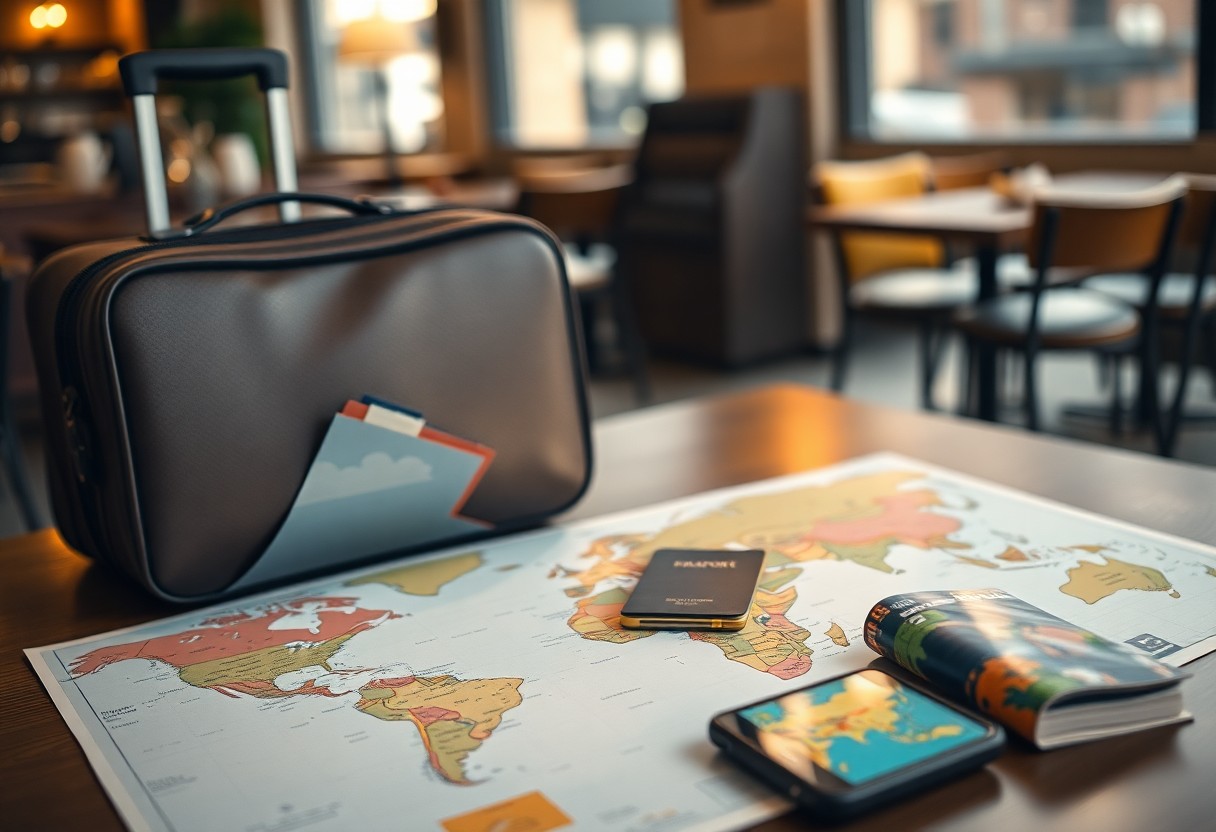
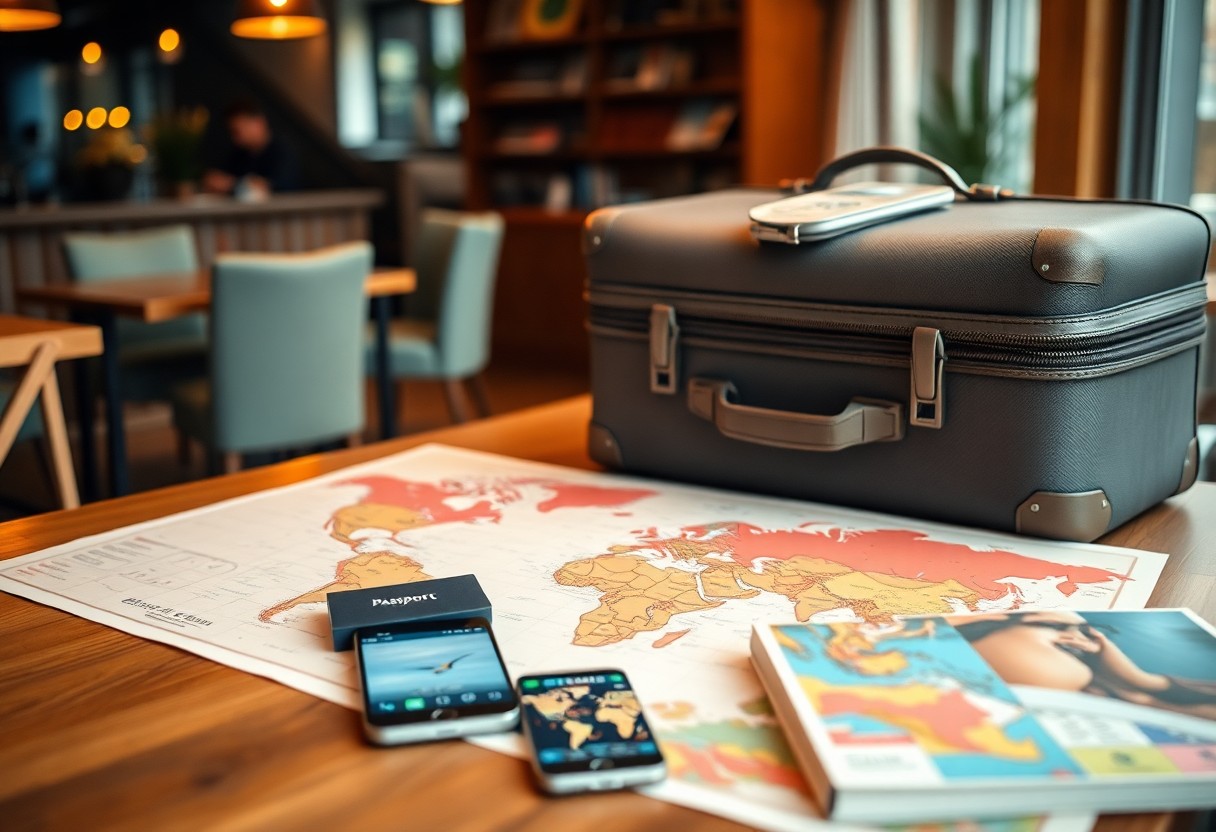
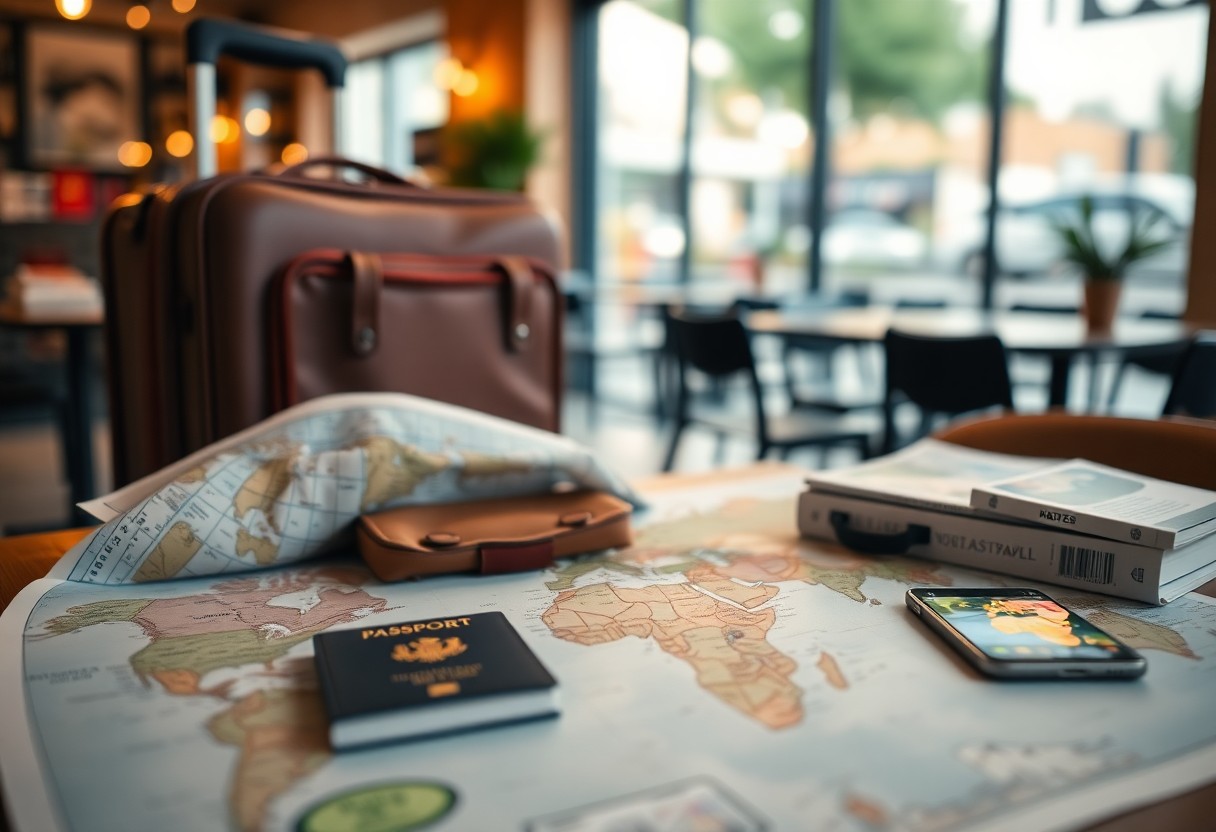
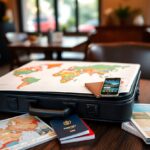


2 thoughts on “The Ultimate Travellers Guides: Everything You Need to Know Before, During, and After Your Trip”